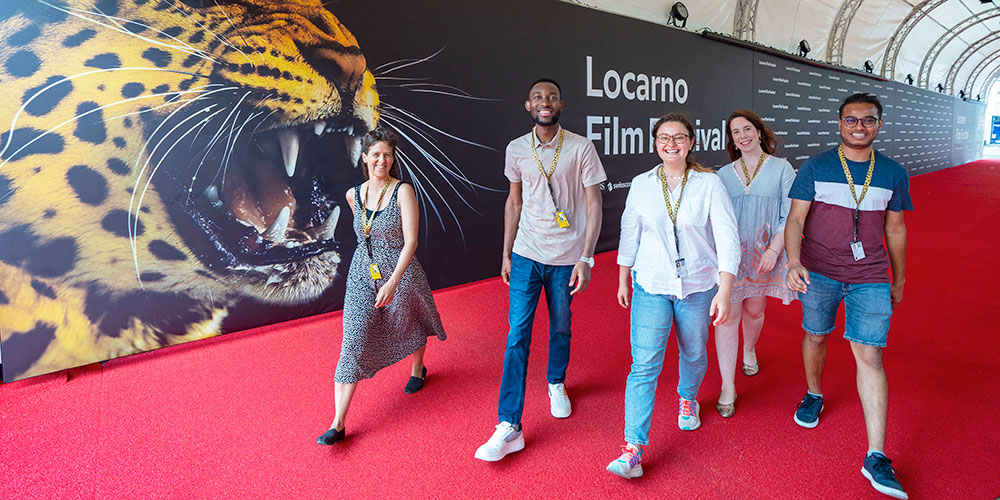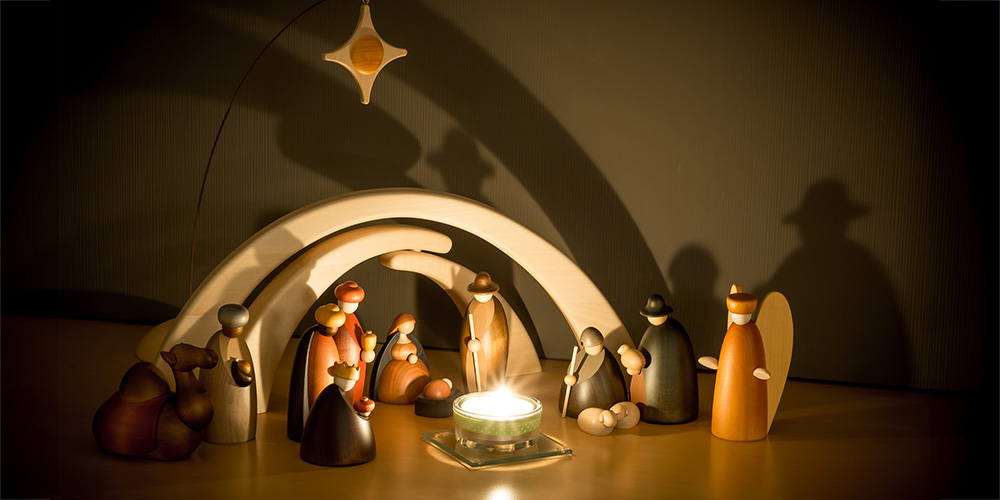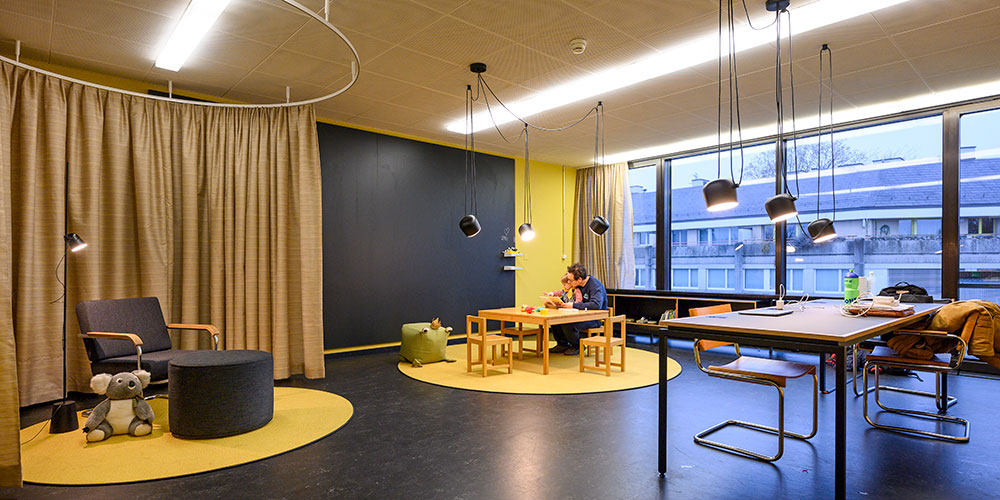A camera, a hypothesis, and a box of popcorn
How can cinematic narrative techniques broaden the understanding of one’s own science communication? Five postdocs and PhD students from the University of Basel attended a workshop on this topic at the Locarno Film Festival. Yuliia Mieriemova, a gender scholar, summarizes what they took away from it.
23 August 2023 | Dr. Yuliia Mieriemova
There was a chair, a long train ride, and the hope that I would meet like-minded folks at the workshop. The chair helped me feel grounded, as I could hardly believe my luck. I was on a train to Locarno watching a soap opera at 8 in the morning, hoping to meet the people that not only appreciate storytelling in research but can teach me how to do it.
Two months ago, at a conference, a colleague asked if my research on women and war was more of a storytelling than actual research. I stumbled and went home angry with myself. I was angry because I could not respond convincingly.
As a postdoc in gender studies, I could have engaged in another heated debate about the validity of the knowledge we produce, but I did not. Instead, I chose to find people from different disciplines who, like myself, thought of storytelling as essential to communicating the findings of a research project, to convey all the passion we have when embarking on the journey of finding what has been previously undiscovered. We were all there for a reason and a treat!
The workshop Storytelling and Storyboarding in Science by Samer Angelone was a sophisticated immersion into the world of science and films connected by a story. It started long before we all gathered at Locarno since we needed to prepare an abstract about our research as if we were telling about it to a friend, and that took work. Later on, we had a chance to reflect on that first attempt by learning how to simplify, intensify and concisely communicate what we knew and wanted to share.
From step outline to captivating titles, slide designs, and ways of doing effective presentations, the very core of the storyboarding and storytelling architecture slowly unfolded throughout three days of the workshop. Equipped with the tools to comprehend complex narratives made us see films differently, more consciously, more appreciatively. The film screening was a different experience now, a fuller, stronger one, where we tried to dissect every detail, every little hint or allusion, forgetting at times that we were also meant to enjoy it without intellectualizing everything. I couldn’t help it; we were scientists, after all!
One of the workshop’s most valuable experiences and a privilege was to interview the filmmakers right after watching their films. It was exceptional to be able to ask questions, to learn from their stories, and to start thinking about telling our own ones in research.
Individual takeaways from the workshop
As an experimental physicist, Debarghya Dutta works with the most advanced cameras to photograph and comprehend the dynamics of electrons in matter. Every evening when the majestic screen at Piazza Grande lighted up, he sat there absorbing the exquisite blend of photos, emotions, and music, which created an extraordinary harmony among the 8,000 people present. He could only dream of one day possessing the power to tell a story about his theory of interacting electrons to a general audience and make them as excited as he was.
The festival indeed came to life for an early-career researcher David M. Azilagbetor, who explores ethical aspects of animal experimentation in Switzerland. His research involves much engagement with the public; thus, the ability to communicate its findings is imperative for his success. He explored and observed the festival, bright and abundant with yellow and black patterns on the buses, handbags, shoes, banners, posters, and buildings in the city, learning how to tell research stories from professionals. What a promise of joy, good films, and invigorating stories!
The cultural habit of gathering to watch a play, just like in the world’s first theater, the Theatre of Dionysos in Athens, felt genuine to the experience of each extensive screening at the Locarno Film Festival for Olivia Denk. A PhD candidate in classical archaeology, she knows precisely where theater was invented. Her studies focus on ancient Greece, particularly the peninsula Chalcidice, where Aristotle was born. For her, it was amazing to realize that the principles of this famous philosopher are used in storytelling to this day.
The power of originality
Stand up for your originality? After a swim, Dr. Sibylle Künzler, a postdoc in cultural anthropology, reflects on the personal tips the filmmakers shared during the interviews. She sits on the shore and lets her gaze wander over the glistening water: theory classes, interviews, and film screenings; originality in all of its meanings, including uniqueness, inherent logic, and inventiveness, makes so much sense for her subject because qualitative research works with case studies and critically reflects on a researcher’s perspective. It is precisely the panorama of possible individual cases and the qualitative differences that inspire Sibylle Künzler so much. Every film the group had seen so far is unique in its way, yet the audience tries to understand it. She says that movies almost seduce you to take a different perspective on a familiar matter.
Ivan Skakov, a PhD student in computational biology from Neuchâtel University, was captivated by the contrast between commercial and independent movies. What a difference it is to experience an authored film with no constraints, rules, or expectations to fulfill. You need to know the rules to understand that you can break them, which is almost impossible in commercial movies because there is always a risk of a lost game with the audience. So he wishes to explore unrestrained authored films as he investigates the evolution of genome architecture in his research journey.
Why are we all sitting here as a heterogeneous group where researchers come from so many different disciplines? Are we here to reflect on the complicated relationship between seemingly simplistic storytelling vs. overly complicated research practices? Shouldn’t storytelling be a part of knowledge-generating practice? A portion of science, really—and not simply sales and promotion?
On my way home to Basel, I thought of watching a movie—a good one with a story to co-create and enjoy. But I couldn’t find one. They might have possibly been left behind at the festival. Or maybe, just maybe, I should start thinking of making my own.
Dr. Yuliia Mieriemova is a postdoctoral researcher in the gender, war and security research group at the University of Basel. She holds an MA in gender and women’s studies and a PhD in comparative linguistics and has a professional background in journalism. Her current research focuses on the role of women in the war in Ukraine, from political leadership to the armed services and the production of political subjects through the everyday making of life and switching between the identities of war and peace.
The workshop Storytelling and Storyboarding in Science was organized by the Graduate Center of the University of Basel.



